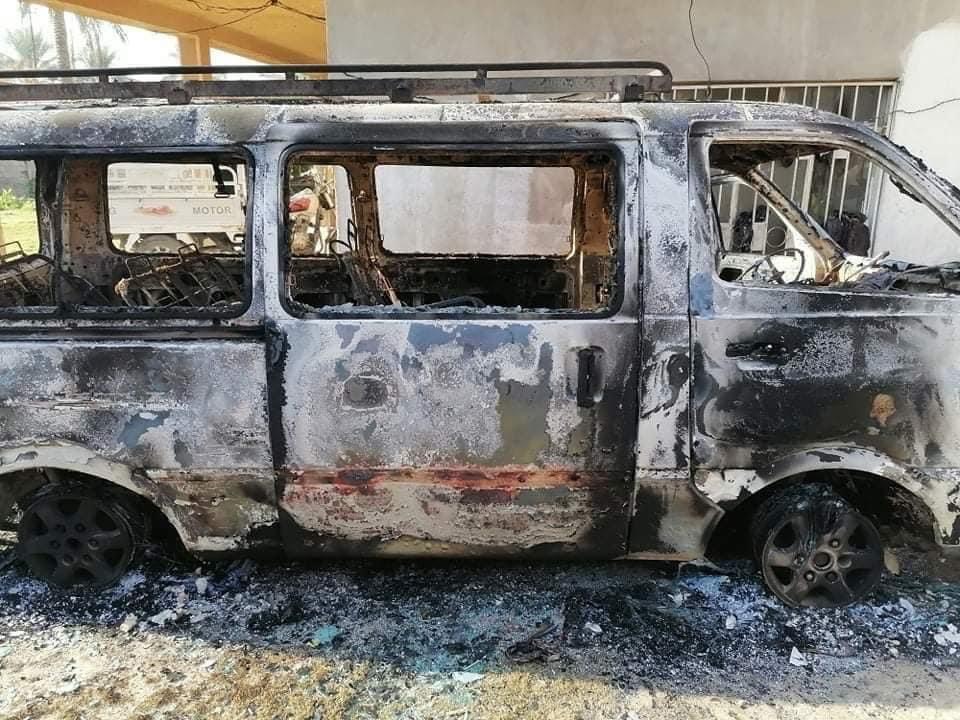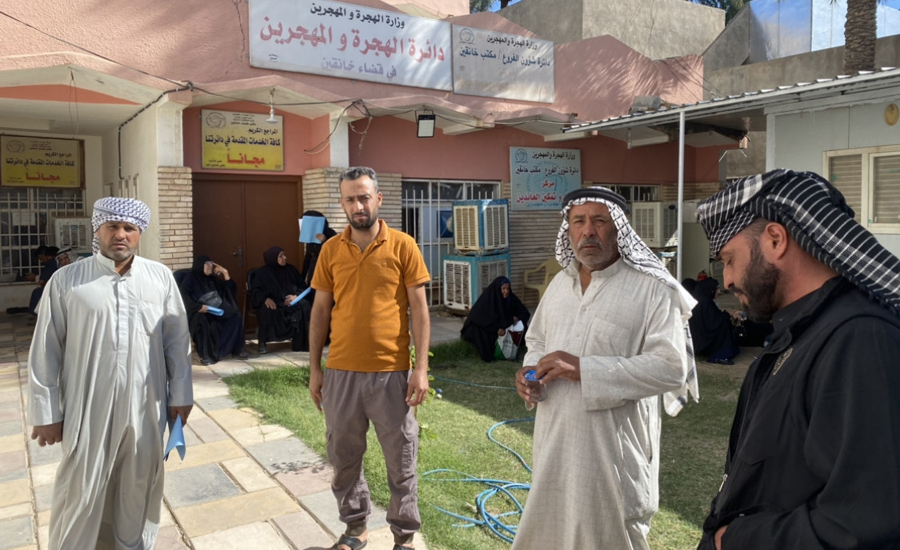The clock was pointing to eight at night, and the sound of heavy gunfire frightened Abdul-Wahhab Omran (70 years old), who was lying on his bed in his house. Shortly, gunmen were setting fire to the homes and vehicles of the villagers, killing several villagers including one of Omran 's sons.
Omran, a Sunni resident, says, "It was a complete chaos all over the village and they said that ISIS militants had come, they raided my son's house and killed him. I didn't realize what was happening. The bodies were scattered in the village. I'm sure they'll kill me too."
I couldn't even carry my son's body because I was sure they would kill me too
The events of this story took place at eight pm of October 26, 2021 in Al-Rashad, a village inhabited by a majority of Shiites in the Miqdadiya District (in Kurdish Shahraban) northeast of Bquba, Diyala Governorate.
The attack on that village came after gunmen raided a chicken farm near the village of al-Rashad and killed a number of young men, and while their families were heading to their rescue, they fell into an ambush that caused a number of other deaths. Less than 16 people in that village.
Except for Omran’s son, all the 15 people killed in the attack in that village were Shiites.
In a statement, the Joint Operations Command in Iraq officially held ISIS responsible for the attack on the village of al-Rashad.
In a retaliatory response, gunmen stormed at dawn of October 27 (five hours after the incident in the village of al-Rashad), the village of Nahr al-Imam - three kilometers from the village of al-Rashad - and killed a number of its residents. They also set fire to the homes and vehicles of the villagers. The raid resulted in murder of nine people, all of them from the Sunni sect.
In total, ISIS militants during the past two weeks have launched 11 attacks against Iraqi security forces ISF and civilians in the disputed territories, mainly in Kirkuk, killing nine people, four of them were civilians.
Sleeper cells and resistant pockets of ISIS militants are regrouping in the rural areas of the disputed territories between Baghdad and Erbil. They are targeting Iraqi forces and civilians in the suburbs of Diyla, Kirkuk Ninawa, Salahaddin and Erbil.
The persistence of ISIS threats comes despite the fact that the former Iraqi Prime Minister Haider al-Abadi announced in late 2017, the complete elimination of ISIS in Iraq, after nearly three years of military confrontations.
Statistics of the KRG Ministry of Peshmerga MOP indicated that ISIS launched "two 2, 412 terrorist attacks in Iraq from the beginning of 2018 until the end of last October.
Diyala province is a majority Sunni Arab province, east of Baghdad, on the border with Iran, and home to 1.2 million people.

A high-ranking source in Diyala Police said in a previous statement to (KirkukNow), "Anger swept the families of the murdered in Al-Rashad village and launched a retaliatory attack on Nahir Al-Imam village, leaving at least nine residents of that village dead, in addition to burning a number of houses and vehicles."
The incident, about which security forces are still investigating while fingers are pointed at the militants of the Islamic State in Iraq and the Levant (ISIL), is about to plunge Miqdadiyah and the entire province into a major sectarian strife that might spread all over Iraq which once was sunk in sectarian violence.
Omran says that all he heard was that ISIS militants had come, “If it was ISIS or any other party, their goal was to ignite a sectarian war in Diyala that would then extend to the rest of Iraq,” which is what he and others residents of the area fear.
"What happened was like Doomsday. Everyone was busy transporting the wounded and the bodies of the dead. We are the only Sunni family live in the Shiite village of al-Rashad. In fact, the residents of this village live in peace and brotherhood, and there is no difference between us."
The next day, Omran left his village and is now is a internally displaced person IDP in Hamrin district. This was the second time he was exposed to something like this in his life, after the sectarian war that erupted in 2006 in most of the Iraqi provinces.
According to statistics from the office of the Iraqi Department of Migration and Displacement in Diyala, 227 families have been displaced from Miqdadiya, most of whom are Sunnis.
Ali Ghazi, Director of Immigration and Displacement in Khanaqin District, said in a statement to KirkukNow "About 37 displaced families from Miqdadiya have arrived in Khanaqin areas."
"The Ministry of Migration and Displacement did not support the idea of establishing a camp for the IDPs, because that would lead to the start of a reverse wave of displacement again,” Ghazi said.
There are efforts to return the displaced to their areas of origin, after stability is restored and the situation calms down
“There are efforts to return the displaced to their areas of origin, after stability is restored and the situation calms down."
Zahra Zuher, a displaced woman from the village of al-Rashad told recalls the night of the accident, the electricity went down suddenly.
“Gunmen raided our house, took my brother and killed him. Then the gunmen asked us about the location of our father, who had gone to help my brother. Later, we heard gunfire. When we went out, we found our father covered in blood and dead."
Adnan al-Tamimi, mayor of Miqdadiya, says that the situation is currently stable in Miqdadiya, and the government plans to restore damaged houses and buildings and “put an end to what happened.”
"There is need to restore the hearts and souls of its residents, not its buildings and walls because such matters should come to end in order to restore safety for the residents of the area," Al-Tamimi added.
On the same night, the Iraqi government decided, at the behest of the Prime Minister and Commander-in-Chief of the Iraqi Armed Forces, Mustafa Al-Kadhimi, to send security reinforcements to the area, formed an investigation committee, and decided to launch several military operations to track down ISIS militants in Miqdadiya and other areas of Diyala Province.
Al-Kadhimi said in a tweet on October 27th "The crime of Al-Miqdadiya against our people will not pass without retribution ... Allah, so bear witness."
Al-Miqdadiya is currently divided into four security sectors, with a military commander responsible for each sector in order to restore security stability, while a rapid response forces unit has been deployed in the area, and the commandos brigade of the Diyala Operations Command is scheduled to be deployed soon in the villages of Miqdadiya.
Last Friday, November 5, followers of the Shiite and Sunni sects performed a unified Friday prayer in the Miqdadiya district, in a move to stave off sedition and avoid the emergence of sectarian conflicts.
After losing his son, Omran calls on the security forces to work on returning all the IDPs to their homes.
"There are parties who want to create cracks and conflicts between Sunnis and Shiites to fuel the sectarian war again but we assure them that they will not achieve their goals," Abdel Wahab adds.
"It is true that we are now displaced, but once it is safe and stable, we will return and we will live in fraternity.”





